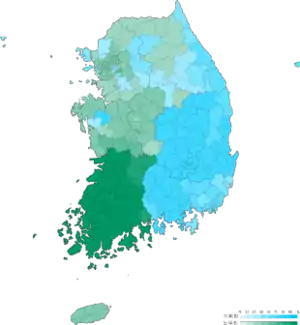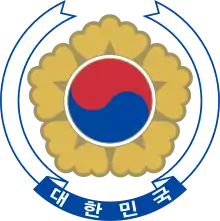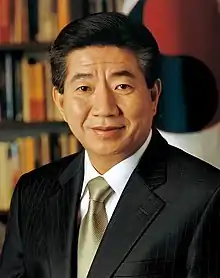2002 South Korean presidential election
Presidential elections were held in South Korea on 19 December 2002. The result was a victory for Roh Moo-Hyun of the ruling Millennium Democratic Party, who defeated Lee Hoi-chang of the Grand National Party by just over half a million votes.[1]
| |||||||||||||||||
| |||||||||||||||||
 Results by province and city ■ – Roh Moo-hyun ■ – Lee Hoi-chang | |||||||||||||||||
 Results by municipality | |||||||||||||||||
| |||||||||||||||||
 |
|---|
| This article is part of a series on the politics and government of the Republic of Korea |
|
|
Background
President Kim Dae-jung's National Congress for New Politics (NCNP) re-branded itself to Millennium Democratic Party (MDP) in 2000, but was struggling as it had defeated by the Grand National Party (GNP) both the 2000 parliamentary election and 2002 gubernatorial elections. GNP's then leader and probable presidential nominee Lee Hoi-chang was polling higher than any MDP candidates.
Primaries
Millennium Democratic Party
For the first time in South Korean history, the Democratic Party nominated its presidential candidate through open primaries.
At the beginning of the primaries, Rhee In-je, the 3-term congressman who ran against President Kim in 1997 but afterwards joined the ruling party, led the other candidates by a considerable margin in every poll. However, fringe candidate Roh Moo-hyun rose to prominence after winning the Gwangju contest, eventually winning his party's nomination and then the presidential election.
Candidates
- Roh Moo-hyun, former Member of National Assembly from Busan
- Rhee In-je, former Governor of Gyeonggi
- Chung Dong-young, Member of National Assembly from North Jeolla
- Kim Joong-kwon, former Member of National Assembly from North Gyeongsang
- Han Hwa-gap, former Member of National Assembly from South Jeolla
- Yu Jong-geun, Governor of North Jeolla
- Kim Geun-tae, Member of National Assembly from Seoul
Contests
| Dates | Races | Roh | Rhee | Chung | Kim J | Han | Yu | Kim G | Total | ||||||||
|---|---|---|---|---|---|---|---|---|---|---|---|---|---|---|---|---|---|
| 9/3 | Jeju | 125 | 18.6% | 172 | 25.6% | 110 | 16.4% | 55 | 8.2% | 175 | 26.1% | 18 | 2.7% | 16 | 2.4% | 671 | 100% |
| 10/3 | Ulsan | 298 | 29.4% | 222 | 21.9% | 65 | 6.4% | 281 | 27.8% | 116 | 11.5% | 20 | 2.0% | 10 | 1.0% | 1,012 | 100% |
| 16/3 | Gwangju | 595 | 37.9% | 491 | 31.3% | 54 | 3.4% | 148 | 9.4% | 280 | 17.9% | - | - | - | - | 1,568 | 100% |
| 17/3 | Daejeon | 219 | 16.5% | 894 | 67.5% | 54 | 4.1% | 81 | 6.1% | 77 | 5.8% | - | - | - | - | 1,325 | 100% |
| 23/3 | South Chungcheong | 277 | 14.2% | 1,432 | 73.7% | 39 | 2.0% | 196 | 10.1% | - | - | - | - | - | - | 1,944 | 100% |
| 24/3 | Gangwon | 630 | 42.5% | 623 | 42.0% | 71 | 4.8% | 159 | 10.7% | - | - | - | - | - | - | 1,483 | 100% |
| 30/3 | South Gyeongsang | 1,713 | 72.2% | 468 | 19.7% | 191 | 8.1% | - | - | - | - | - | - | - | - | 2,372 | 100% |
| 31/3 | North Jeolla | 756 | 34.3% | 710 | 32.2% | 738 | 33.5% | - | - | - | - | - | - | - | - | 2,204 | 100% |
| 5/4 | Daegu | 1,137 | 62.3% | 506 | 27.7% | 181 | 9.9% | - | - | - | - | - | - | - | - | 1,824 | 100% |
| 6/4 | Incheon | 1,022 | 51.9% | 816 | 41.4% | 131 | 6.7% | - | - | - | - | - | - | - | - | 1,969 | 100% |
| 7/4 | North Gyeongsang | 1,246 | 59.4% | 668 | 31.9% | 183 | 8.7% | - | - | - | - | - | - | - | - | 2,097 | 100% |
| 13/4 | North Chungcheong | 387 | 32.1% | 734 | 61.0% | 83 | 6.9% | - | - | - | - | - | - | - | - | 1,204 | 100% |
| 14/4 | South Jeolla | 1,297 | 62.0% | 454 | 21.7% | 340 | 16.3% | - | - | - | - | - | - | - | - | 2,091 | 100% |
| 20/4 | Busan | 1,328 | 62.5% | - | - | 796 | 37.5% | - | - | - | - | - | - | - | - | 2,124 | 100% |
| 21/4 | Gyeonggi | 1,191 | 45.5% | - | - | 1,426 | 54.5% | - | - | - | - | - | - | - | - | 2,617 | 100% |
| 26/4 | Internet Voting | 1,423 | 81.3% | - | - | 327 | 18.7% | - | - | - | - | - | - | - | - | 1,750 | 100% |
| 27/4 | Seoul | 3,924 | 66.5% | - | - | 1,978 | 33.5% | - | - | - | - | - | - | - | - | 5,902 | 100% |
| Total | 17,577 | 72.2% | - | - | 6,767 | 27.8% | - | - | - | - | - | - | - | - | 24,344 | 100% | |
Candidates
- Lee Hoi-chang, former Prime Minister
- Choi Byung-ryul, Member of the National Assembly from Seoul
- Lee Bu-young, Member of the National Assembly from Seoul
- Lee Sang-hee, former Minister of Science and Technology[2]
Contests
| Dates | Races | Lee H | Choi | Lee B | Lee S | Total | |||||
|---|---|---|---|---|---|---|---|---|---|---|---|
| 13/4 | Incheon | 1,111 | 79.3% | 79 | 5.6% | 201 | 14.3% | 10 | 0.7% | 1,401 | 100% |
| 18/4 | Ulsan | 446 | 59.0% | 206 | 27.2% | 73 | 9.7% | 31 | 4.1% | 756 | 100% |
| 20/4 | Jeju | 361 | 73.4% | 65 | 13.2% | 48 | 12.1% | 18 | 2.2% | 492 | 100% |
| 23/4 | Gangwon | 891 | 80.5% | 101 | 9.1% | 71 | 6.4% | 44 | 4.0% | 1,107 | 100% |
| 24/4 | North Gyeongsang, Daegu | 3,143 | 83.7% | 427 | 11.4% | 133 | 3.5% | 54 | 1.4% | 2,757 | 100% |
| 27/4 | North Jeolla | 505 | 54.2% | 117 | 12.6% | 278 | 29.9% | 31 | 3.3% | 931 | 100% |
| 28/4 | South Gyeongsang, Busan | 2,895 | 70.1% | 934 | 22.6% | 197 | 4.8% | 103 | 2.5% | 4,129 | 100% |
| 30/4 | South Chungcheong, Daejeon | 1,643 | 83.6% | 153 | 7.8% | 124 | 6.3% | 45 | 2.3% | 1,965 | 100% |
| 2/5 | South Jeolla, Gwangju | 1,112 | 54.0% | 368 | 17.9% | 512 | 24.9% | 67 | 3.3% | 2,059 | 100% |
| 4/5 | Gyeonggi | 2,461 | 71.3% | 424 | 12.3% | 486 | 14.1% | 81 | 2.3% | 3,452 | 100% |
| 7/5 | North Chungcheong | 592 | 72.3% | 152 | 18.6% | 60 | 7.3% | 15 | 1.8% | 819 | 100% |
| 9/5 | Seoul | 2,321 | 47.9% | 1,668 | 34.5% | 743 | 15.3% | 109 | 2.3% | 4,841 | 100% |
| Total | 17,481 | 69.0% | 4,694 | 18.3% | 2,926 | 11.4% | 608 | 2.4% | 25,709 | 100% | |
Democratic Labor Party
Labor activist Kwon Young-ghil of the Democratic Labor Party was nominated for president.[3]
| Votes | % | |
|---|---|---|
| For Kwon Young-ghil | 7,297 | 90.8 |
| Against | 735 | 9.2% |
| Total | 8,032 | 100% |
| Registered voters/turnout | 12,877 | 62.4% |
Roh-Chung coalition
Chung Mong-joon, the 3-term independent congressman from Ulsan and son of Hyundai founder Chung Ju-yung, became so popular that he began appearing on polls for presidential election after he, as the president of the Korean Football Association, was credited for winning the right to host 2002 FIFA World Cup in Korea.[4]
Chung officially launched his presidential campaign in September, and in many polls beat Roh and came close to beating Lee. Many Democratic politicians that weren't happy with Roh's nomination joined Chung's campaign. However, when it seemed clear that if both Roh and Chung ran, Lee would win easily. The two sides decided to combine forces, instead of competing against each other.
The two sides agreed on conducting two polls, each by different polling companies, where the winner would run as the unified candidate. The winner had to win both polls, or a second round had to occur.
So the two poll was conducted on 24 November, but only one validated. The other one was invalidated, as the two sides had agreed that any poll with Lee Hoi-chang polling less than 30.4% must be invalidated, since there could be a chance that Lee's supporters were attempting to manipulate the results by responding with an untrue answer.
The only poll that was validated was the one conducted by the Research and Research, and it was won by Roh.
Consequently, Chung withdrew his candidacy and endorsed Roh.[5]
| Candidate | Research and Research Poll | # of polls won |
|---|---|---|
| Roh | 46.8% | 1 |
| Chung | 42.2% | 0 |
| Lee | 32.1% | - |
However, Chung later broke his pledge on the night before the election, when he felt that Roh broke the promise to include Chung in for policy decisions and surrounded himself only with Democrats.[6] Chung announced less than eight hours before the election that he was withdrawing his support for Roh and urged people to vote their conscience, but Roh won anyway.
Results
| Candidate | Party | Votes | % of votes | |
|---|---|---|---|---|
| Roh Moo-hyun | Millennium Democratic Party | 12,014,277 | 48.91% |  |
| Lee Hoi-chang | Grand National Party | 11,443,297 | 46.59% |  |
| Kwon Young-ghil | Democratic Labour Party | 957,148 | 3.90% | |
| Lee Han-dong | One National People Unite(하나로국민연합) | 74,027 | 0.3% | |
| Kim Gil-soo | Fatherland Defenders Party(호국당) | 51,104 | 0.2% | |
| Kim Yeong-Gyu | Socialist Party | 22,063 | 0.1% | |
| Jang Se-dong | Independent | Forfeited | - | |
| Invalid ballots | 223,047 | 0.6% | ||
| (Total electorate: 34,991,529 - Turnout rate: 70.8%) Total | 24,784,963 | 100% | ||
| regions · provinces · cities | .jpg.webp) |
.jpg.webp) | |||
|---|---|---|---|---|---|
| Roh Moo-hyun MDP |
Lee Hoi-chang GNP | ||||
| Votes | % | Votes | % | ||
| Sudogwon | Seoul | 2,792,957 | (51.3%) | 2,447,376 | (44.96%) |
| Incheon | 611,766 | (49.83%) | 547,205 | (44.57%) | |
| Gyeonggi | 2,430,193 | (50.65%) | 2,120,191 | (44.19%) | |
| Gangwon | 316,722 | (41.51%) | 400,405 | (52.48%) | |
| Chungcheong | Daejeon | 369,046 | (55.09%) | 226,760 | (39.82%) |
| Chungcheongbuk | 365,623 | (50.42%) | 311,044 | (42.89%) | |
| Chungcheongnam | 474,531 | (52.16%) | 375,110 | (41.23%) | |
| Honam (Jeolla) |
Gwangju | 715,182 | (95.18%) | 26,869 | (3.58%) |
| Jeollabuk | 966,053 | (91.59%) | 65,334 | (6.19%) | |
| Jeollanam | 1,070,506 | (93.39%) | 53,074 | (4.63%) | |
| Yeongnam (Gyeongsang) |
Busan | 587,946 | (29.86%) | 1,314,274 | (66.75%) |
| Ulsan | 178,584 | (35.27%) | 267,737 | (52.88%) | |
| Daegu | 240,745 | (18.68%) | 1,002,164 | (77.75%) | |
| Gyeongsangbuk | 311,358 | (21.65%) | 1,056,446 | (73.47%) | |
| Gyeongsangnam | 434,642 | (27.08%) | 1,083,564 | (67.52%) | |
| Jeju | 148,423 | (56.05%) | 105,744 | (39.63%) | |
| Wikimedia Commons has media related to President of South Korea. |
References
- "IFES Election Guide | Elections: South Korea Presidential Dec 19 2002". www.electionguide.org. Retrieved 2017-04-25.
- "donga.com[정치:한나라당 경선]". www.donga.com. Retrieved 2018-04-20.
- ""세상 바꾸려 대통령 후보 나섰다'20억 기탁금' 목숨 걸고 싸울터"". 오마이뉴스. 2002-09-09. Retrieved 2018-04-20.
- "[여론조사 자료실]민주 통합신당 대선후보 선호도 鄭42.1%-盧29.5%". news.donga.com (in Korean). 2002-09-08. Archived from the original on 2018-04-21. Retrieved 2018-04-20.
- nozzang (2008-06-13), 노무현 단일후보 확정 그 숨막히던 현장, retrieved 2018-04-20
- "정몽준, 자서전서 "노무현 전 대통령 지지 철회 이유는…"" (in Korean). Retrieved 2018-04-20.

_(cropped).jpg.webp)